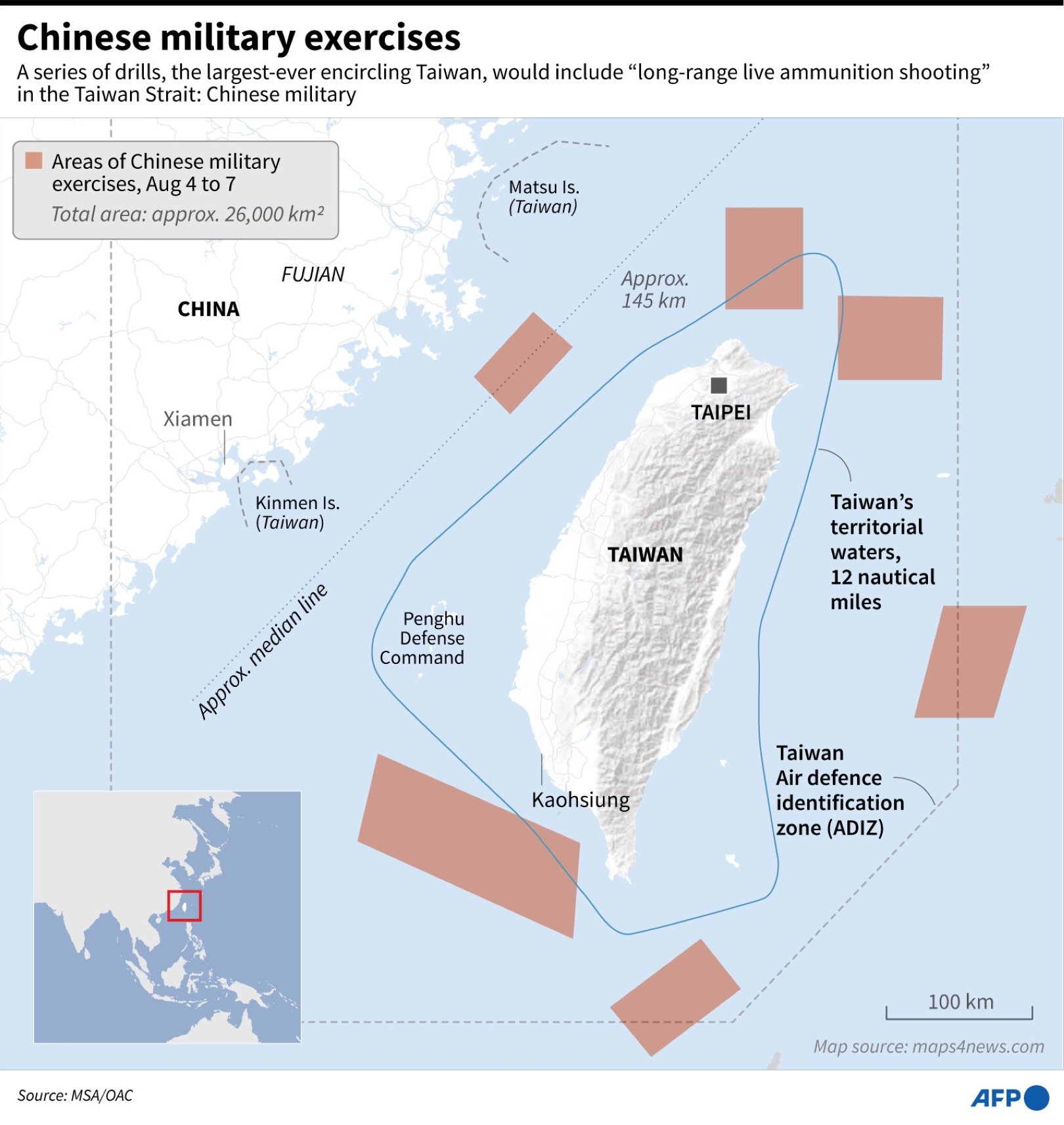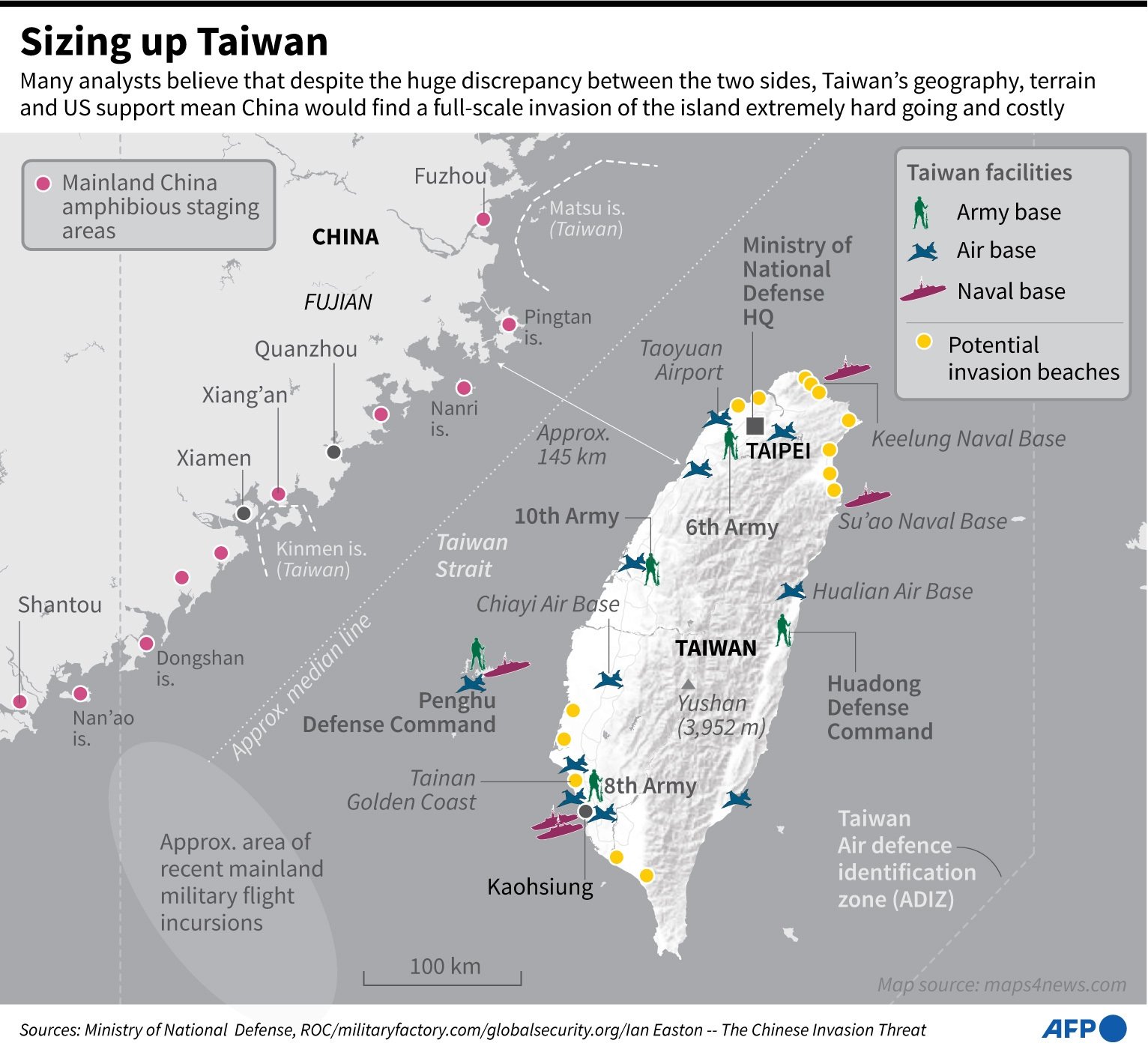© Turkuvaz Haberleşme ve Yayıncılık 2024
China fired ballistic missiles and deployed fighter jets and warships on Thursday as it held its largest-ever military exercises encircling Taiwan, in a show of force straddling vital international shipping lanes a day after a visit by U.S. House of Representatives Speaker Nancy Pelosi to the self-ruled island.
The exercises, China's largest ever in the Taiwan Strait, began as scheduled at midday and included live-firing in the waters to the north, south and east of Taiwan, bringing tensions in the area to their highest in a quarter century.
Pelosi left Taiwan Wednesday after a trip that defied a series of stark threats from Beijing, which views the island as its territory.
It sparked a furious reaction from Beijing, which vowed "punishment" and announced military drills in the seas around Taiwan – some of the world's busiest waterways.
Taiwan's Defense Ministry said 11 Chinese Dongfeng ballistic missiles had been fired in waters around the island. The last time China fired missiles into waters around Taiwan was in 1996.
Taiwan officials have said the drills violate United Nations rules, invade Taiwan's territorial space and are a direct challenge to free air and sea navigation.
China is conducting drills on the busiest international waterways and aviation routes and that is "irresponsible, illegitimate behavior," Taiwan's ruling Democratic Progressive Party said.
Taiwan's Cabinet spokesperson, expressing serious condemnation of the drills, said also that the websites of the Defense Ministry, the Foreign Ministry and the presidential office were attacked by hackers.

Chinese naval ships and military aircraft briefly crossed the Taiwan Strait median line several times on Thursday morning, a Taiwanese source briefed on the matter told Reuters.
By midday, warships from both sides remained in the area and in close proximity, and Taiwan scrambled jets and deployed missile systems to track multiple Chinese aircraft crossing the line.
Taiwan scrambled jets and deployed missile systems to track multiple Chinese aircraft crossing the line.
"They flew in and then flew out, again and again. They continue to harass us," the Taiwanese source said.
China, which claims Taiwan as its own territory and reserves the right to take it by force, said on Thursday its differences with the self-ruled island were an internal affair.
"Our punishment of pro-Taiwan independence diehards, external forces is reasonable, lawful," China's Beijing-based Taiwan Affairs Office said.
China's Foreign Minister Wang Yi called Pelosi's visit to Taiwan a "manic, irresponsible and highly irrational" act by the United States, state broadcaster CCTV reported.
Wang, speaking at a meeting of Southeast Asian foreign ministers in Phnom Penh, Cambodia, said China had made the utmost diplomatic effort to avert crisis, but would never allow its core interests to be hurt.
The foreign ministers in a statement had earlier warned that volatility caused by tensions in the Taiwan Strait could lead to "miscalculation, serious confrontation, open conflicts and unpredictable consequences among major powers."
The Taiwanese Cabinet said the drills would disrupt 18 international routes passing through its flight information region (FIR).
Hong Kong carrier Cathay Pacific said it had ordered its aircraft to "avoid going through the designated airspace zones around the Taiwan region."

The maneuvers will take place along some of the busiest shipping routes on the planet, used to supply vital semiconductors and electronic equipment produced in East Asian factory hubs to global markets.
Beijing has defended the drills as "necessary and just," pinning the blame for the escalation on the United States and its allies.
"In the current struggle surrounding Pelosi's Taiwan visit, the United States are the provocateurs, China is the victim," Foreign Ministry spokesperson Hua Chunying told a regular briefing Wednesday.
A Chinese military source also told Agence France-Presse (AFP) the exercises would be staged "in preparation for actual combat."
"If the Taiwanese forces come into contact with the PLA on purpose and accidentally fire a gun, the PLA will take stern countermeasures, and all the consequences will be borne by the Taiwanese side," the source said.
Unusually, the drills in six areas around Taiwan were announced with a locator map circulated by China's official Xinhua news agency earlier this week – a factor that for some analysts and scholars shows the need to play to both domestic and foreign audiences.
On Thursday, the top eight trending items on China's Twitter-like Weibo service were related to Taiwan, with most expressing support for the drills or fury at Pelosi.
"Let's reunite the motherland," several users wrote.
In Beijing, security in the area around the U.S. Embassy remained unusually tight on Thursday as it has been throughout this week. There were no signs of significant protests or calls to boycott U.S. products.
"I think this (Pelosi's visit) is a good thing," said a man surnamed Zhao in the capital's central business district. "It gives us an opportunity to surround Taiwan, then to use this opportunity to take Taiwan by force. I think we should thank Comrade Pelosi."
Pelosi, the highest-level U.S. visitor to Taiwan in 25 years, praised its democracy and pledged American solidarity during her brief stopover, adding that Chinese anger could not stop world leaders from traveling there.
China summoned the U.S. ambassador in Beijing in protest against her visit and halted several agricultural imports from Taiwan.
"Our delegation came to Taiwan to make unequivocally clear that we will not abandon Taiwan," Pelosi told Taiwan's President Tsai Ing-wen, who Beijing suspects of pushing for formal independence – a red line for China.
"Now, more than ever, America's solidarity with Taiwan is crucial, and that's the message we are bringing here today."
The United States and the foreign ministers of the Group of Seven nations warned China against using Pelosi's visit as a pretext for military action against Taiwan.
White House national security spokesperson John Kirby said earlier in the week that Pelosi was within her rights to visit Taiwan, while stressing that the trip did not constitute a violation of Chinese sovereignty or America's longstanding "one-China" policy.
The U.S. has no official diplomatic relations with Taiwan but is bound by American law to provide it with the means to defend itself.
China views visits by U.S. officials to Taiwan as sending an encouraging signal to the pro-independence camp on the island. Taiwan rejects China's sovereignty claims, saying only the Taiwanese people can decide the island's future.
